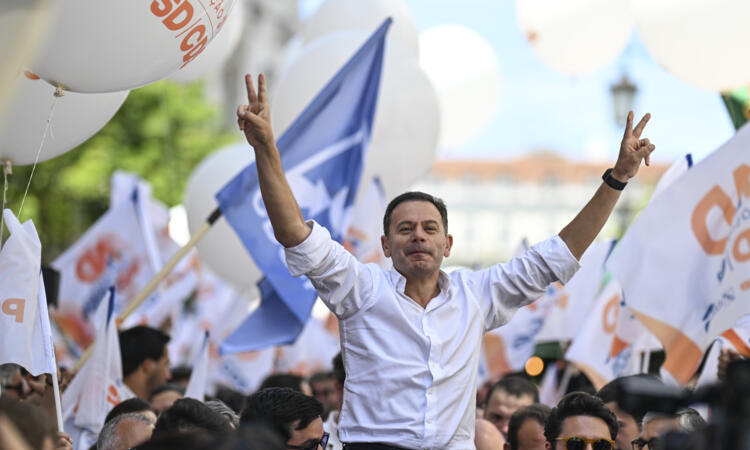News Flash

LISBON, May 17, 2025 (BSS/AFP) - Waving colourful flags, hundreds of campaigners took to Lisbon's streets on Friday ahead of Portugal's weekend general election that Prime Minister Luis Montenegro is expected to win, but with no guarantee he can form a more stable government.
Support for his centre-right Democratic Alliance (AD) has inched up in the final days of the campaign to hit 34 percent, against 26 percent for the Socialist Party (PS), according to a poll by Portugal's prestigious Catholic University published by local media on Friday.
The upstart far-right Chega ("Enough") party could take 19 percent of the vote -- almost the same as it did in March 2024 elections -- to consolidate its position as Portugal's third political force and kingmaker.
Montenegro, as a result, risks finding himself again at the head of a minority government, caught between the PS, in power from 2015 to 2024, and Chega, with which he has refused to govern.
The premier, a 52-year-old lawyer, urged voters to give him a stronger mandate this time around at a rally in central Lisbon, where supporters carried him on their shoulders as he flashed a "V for victory" sign with his fingers.
"People are fed up with elections, people want stability," he said, surrounded by backers carrying balloons and flags in the AD's white and orange colours.
Sunday's early election will be Portugal's third in just over three years.
It was called in March after Montenegro lost a confidence vote in parliament following accusations of conflicts of interest stemming from his consulting firm's business.
As such, just "staying in power would already be a good result" for the prime minister, who took a "calculated risk" in the hope of strengthening his parliamentary seat, political commentator Paula Espirito Santo told AFP.
- Election fatigue -
The PS candidate, Pedro Nuno Santos, a 48-year-old economist, has accused Montenegro of engineering the elections "to avoid explaining himself" about his consultancy firm to a parliamentary inquiry.
Only the PS can provide the "safe change" the country needs, he told journalists at his party's final street rally, surrounded by chanting supporters waving red and white party flags.
Faced with the risk of persistent instability, analysts and voters branded the political class out of touch with voters who are unenthused by the prospect of another ballot.
"Politics is becoming more and more despicable, it's disgusting," said Antonio Mocho, a 65-year-old pensioner who lives in the suburbs of the Portuguese capital.
"These elections were avoidable. This doesn't make any sense."
Under the Socialist Party, Portugal became one of Europe's most open countries for foreigners but Montenegro's government has since toughened immigration policy.
Between 2017 and 2024, the number of foreigners living in Portugal quadrupled, reaching about 15 percent of the total population.
- Health woes -
The left has accused the government of pandering to far-right voters after it announced the expulsion of 18,000 irregular immigrants during the campaign.
"Anyone who doesn't play by the rules, who isn't legal, will have to leave Portugal," Montenegro told a final rally at Lisbon's bullring, saying the Socialist Party had left Portugal in "bedlam" due to immigration.
Immigration and suspicions about the prime minister might be fertile ground for the far right.
But Chega has also faced embarrassment, including claims that one of its lawmakers in the Azores stole luggage from airport carousels.
Its campaign was interrupted on two occasions this week when its president, 42-year-old former football commentator Andre Ventura, abruptly abandoned rallies due to sharp stomach pains and was rushed to hospital both days.
He had not been scheduled to campaign on Friday, but appeared at his party's final rally in Lisbon, wearing a white t-shirt that left adhesive dressings on both his arms visible.
"I couldn't not be here with you today," Ventura said, speaking more slowly than usual as he repeated his calls for more restrictions on immigration.
All political campaigning has to stop at midnight (2300 GMT Friday) before Sunday's poll.